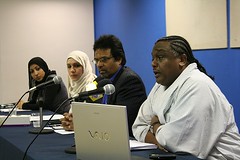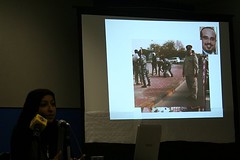

29 Sep 2010
Gulf Cultural Club in conjunction with “Open Debate” organized on September 29, 2010 a special seminar at which three speakers touched on the various issues of the recent crisis in Bahrain.
The seminar started with the speech of Miss Mariam Al-Khawaja of the Bahrain Center for Human Rights on the general situation in the country,


29 Sep 2010
Gulf Cultural Club in conjunction with “Open Debate” organized on September 29, 2010 a special seminar at which three speakers touched on the various issues of the recent crisis in Bahrain.
The seminar started with the speech of Miss Mariam Al-Khawaja of the Bahrain Center for Human Rights on the general situation in the country, where she presented an overview of Bahrain in terms of location, population and demographics. Turning to indicators of the systematic policy of discrimination practiced by the Bahraini government against Shiite Muslims, who make up 70 percent of the population. She also provided statistics on the Shiite marginal share of the managerial positions in the state, and said that what is happening in Bahrain is a shout from the depths of the disadvantaged in this country, in which injustice is perpetrated against its own people.
Then came a speech by Chancellor, Dr. Salah al-Bandar, who became known in Bahrain after he released governmental documents on the secret network established by the Royal Court and led by Ahmad Ateyatallah al-Khalifa. Al- Bandar talked about the current situation and the reasons that led to it. He attributed that to an important economic dimension, pointing to three branches involved in the national economy planning and management, namely: the Economic Development Board, Chamber of Commerce, and the Central Bank And Financial Exchange. He stressed that these three branches are closed to the Shiites, and the members of its management team have been carefully chosen under the chairmanship of a member of the royal family.
The new point in the analysis provided by Al-Bandar was that the current conflict has been contrived by the ruling family for economic reasons in the first place. He said that at the time where the gross national product does not exceed $ 11 billion annually, the money held by banks and which is moving the economy was between 2006 and 2007 up to $ 253 billion which is more than 20 times the annual national income. But the explosion of the security situation at the end of 2007 and subsequent political collapse prompted many investors to leave the country, and landed assets of the funds held in banks in less than five months later with about $ 30 billion, to become a $ 223 billion.
Al-Bandar says that in that year the Americans and the British showed concern about the continuing security tension, so they instructed Sheikh Hamad to start a dialogue with the opposition, thus the communication with the opposition initiative occurred in London in April 2008. As it became clear that the initiative had failed, preparation to beat the opposition harshly started, the crackdown came under the leadership of the king of the country himself in the hope that it will lead to ending the opposition completely, especially after the failure of previous security crackdowns, (such as Alhujairah case).
Al-Bandar indicates that the ruling family use the policy of concentration of retrenchment sectarian to prevent any national cohesion, and to get the support of Arab and Gulf states.
Finally, Ms. Hanifa Sarwar of the Islamic Human Rights Commission, touched on the broad human rights violations in Bahrain, by providing testimonies of the IHRC representative, who attended the trials of the two sets of Karzakan and Ma’ameer, and witnessed how the authority dealt with the protesters in the court, and the beating of their families. She also touched on the phenomenon of the politicization of the judiciary, and how the detainees of Karzakan were sentenced to jail after a trial that lacked the most basic standards of justice. Although acquitted of the charges against them, a political decision led to the re-arrest and sentencing.
Watch recorded videos of the seminar:
Part 1 – Miss. Mariam Al-Khawaja – Bahrain Center for Human Rights
Part 2 – Dr. Salah al-Bandar
Part 3 – Dr. Salah al-Bandar
Part 4 – Dr. Salah al-Bandar
Part 5 – Dr. Salah al-Bandar
Part 6 – Ms. Hanifa Sarwar – the Islamic Human Rights Commission
Part 7 – Ms. Hanifa Sarwar – the Islamic Human Rights Commission
Part 8 – Open discussion
